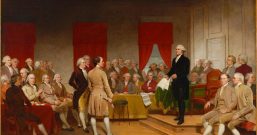One Cheer for Scalia on Legal Education
In a speech at William and Mary Law School last weekend Justice Antonin Scalia rejected the idea of a two-year course of legal education and assailed at least some law professors as overpaid teachers of irrelevant material. He is wrong about the two-year path, but half right about some professors.
Scalia’s rejection of the two-year proposal is rooted in his view that three years are necessary to create “a legal professional,” but he provides no evidence for this claim. He does not consider the history of the requirement, which suggests that a three-year law course arose as a method of shielding incumbents from competition, particularly from immigrant families who would have difficulty affording lengthy legal education. Economists are generally wary of process requirements—like a three-year requirement for a law degree—as opposed to a performance requirement—passing the bar exam. The former tends to create a barrier to entry with no clear relation to improved output.
Scalia also does not take into account that law is a very variegated profession and that legal education should reflect this variety. Lawyers working on small routine matters may not need as much education as lawyers working on ten billion dollar deals. But a three-year educational requirement raises the costs of legal services to people who would be helped by lawyers of more modest education on more modest transactions. Certainly so long as both the lawyer with two years of education and those with three years have passed the bar exam, we should let the market sort out differences in quality.
Indeed, even beyond the two-year degree there should be more, not fewer, kinds of educational routes to prepare for a legal career. Russell Mangas and I have suggested that educational institutions be allowed to offer an undergraduate option where students could sit for the bar after majoring in law. This undergraduate option would substantially decrease the cost of legal education and thus in the long run reduce the costs of legal services, particularly to the poor and middle class. We do have evidence from other countries, suggesting that this option would not unduly diminish the quality of lawyers.
Scalia’s other claim about irrelevant law courses has some validity. There is no doubt a tension between a professor’s research interests and the practical needs of students—a tension that has increased as law schools move closer to the university in their outlook and farther away from the practicing bar. But there is no reason to resolve this tension in the same way at all law schools any more than there is reason to require a single educational platform as preparation for the bar exam.
Students at Yale Law school, for instance, may well need less doctrinal training because of their innate ability. Society as well as professors at Yale may well benefit from unusual courses that provide new ways of thinking about law. The problem is many schools are trying to become junior varsity Yales with professors of similar research orientation and a curriculum to match. Fortunately the crisis in legal education is likely to impose more discipline and create more differences among law schools that respond to the different needs of their students.
The more we can deregulate the market for legal education, the faster this discipline will occur. It is odd that Justice Scalia, who is generally a market enthusiast, does not recognize the connection.


